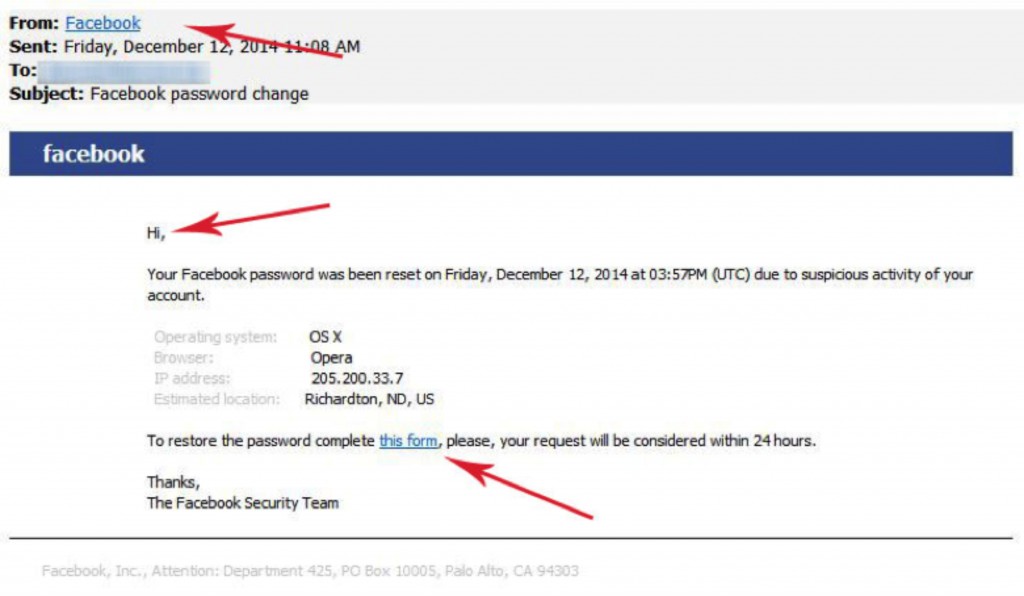Facebook Password Reset Scam!
Scam of the Day: Facebook Password Reset Scam
 [space10]
[space10]
The Email:
 Many of the phishing scams you may see in your mailbox are designed to alarm you into clicking, but look genuine enough at a glance so you don’t look that close. In a rush to fix things and at a cursory glance, you just click the links and do as instructed. Today’s phishing example, the Facebook Password Reset Scam does just that. And it’s rather sneaky about it.
Many of the phishing scams you may see in your mailbox are designed to alarm you into clicking, but look genuine enough at a glance so you don’t look that close. In a rush to fix things and at a cursory glance, you just click the links and do as instructed. Today’s phishing example, the Facebook Password Reset Scam does just that. And it’s rather sneaky about it.
The email in question claims to be from Facebook and the subject simply says “Facebook password change.” Then comes the familiar blue Facebook header and the name.
The message gives cursory information with little detail and instructions you to click on a link and fill out a form in order to restore your password.
The Facebook Reset Scam:
This is a traditional email scam designed to get you to click on the link. The link does not go to Facebook. Instead, clicking either sends you to a form to submit private information, or the link may lead you to a site that will put malware on your computer.
How to Know:
This email is tricky and easy to mistake for the real thing but there are a few details to look for that can tip you off to understanding this is a scam.
1. Hover your mouse over the email link after “From”. In this case it claims to be from Facebook. Hovering over the blue link with your mouse turns up something different: At the bottom of your screen, you see that “@armcandys.co.uk” is the domain from the provided email, not Facebook!
2. Hover your mouse arrow over the other link in the email, “this form”, the one you are instructed to click on to reset your password. Instead of clicking, look again at the provided URL. In this case, we have an entirely different and unknown URL.
3. Often, social media, banks, and other sites that you have an account with will greet you by the name you have signed up through them with. It is uncommon that you will receive a serious piece of correspondence without any indication as to who the email is addressed to.
What To Do:
If you get an email like this and you’re not sure if it’s real or a scam, there are a couple ways to follow up.
1. Do NOT click on the link and follow instructions. Instead, go to your browser, type in the proper URL to the real site and see if you can log in. If you have no problem logging in, then your password has not been reset.
2. Ignore and delete the phishing email.
3. If you would like to follow up on it further, go to the Facebook website and see if they have any information on phishing. They may ask you to send a copy of the scammy email, and give you further instructions on what to do.
Scams of this nature, and phishing emails in general, tend to revolve around surprise and fear, operating under the assumption that the user will click and act without thinking.
We here at Appletree Mediaworks will continue to keep you informed on the nature of these scams so when one of them lands in your mailbox, you are better informed, can stop and think about what you are seeing, and be much better prepared.
[alertbox] Want to know more about email and internet scams? Visit our articles on Paypal Phishing, Domain Slamming, Ransomware, Energy Bill Service Scams, and Court Notice Scams. [/alertbox]
Good Links or Bad Links?
 Are Links Good or Bad?
Are Links Good or Bad?
Are links to and from your website good or bad? To most people this probably seems to be a no-brainer. Of course links are good, that’s what the web is all about, right? Google’s robots crawl the links, it’s how the Web Was Won.
But, Google says that links can be too much of a good thing. For years people have bought and sold links, created link farms, and used other bad tactics to beef up their SEO via links. And then one of Google’s updates hit, and fears spread that links were bad and to be avoided.
What is the truth here?
The truth is likely somewhere in the middle. Practical, useful links to and from other sites are important. But people tend to be afraid of any change Google makes, and take the extreme opposite stance.
Good Practices
- Directory and Citation Listings. Linking to your site from high quality directory listings makes sense because your website is supposed to be a hub for your online company or brand to begin with. It is common sense to send people from directories to your site so that they can have access to as much information as possible.

- Blog Posts. If you are writing for topical, appropriate blogs then it makes sense to link back. Google may penalize for back links that make no sense, but if you are a social media expert doing a guest post on a website blog, one expects a link to additional information. Google is said to have made bad judgment calls here with their penalties, but taking extreme measures does no good either.
- Social Media. Social media has been a nice way to spread information and even today this makes sense. Like directory listings that point to your web as the hub of your brand, social media is an active way to share info and let others pass it along.
Bad Practices
- Link Farms. According to Google, a link farm is “a set of web pages
 created with the sole aim of linking to a target page, in an attempt to improve that page’s search engine ranking.” Paying a company for the sheer purpose of spamming the world with links is a sure way to offend the Google Robots.
created with the sole aim of linking to a target page, in an attempt to improve that page’s search engine ranking.” Paying a company for the sheer purpose of spamming the world with links is a sure way to offend the Google Robots. - Black Hat SEO. From link manipulation, to automated Google queries, to keyword stuffing, Black Hat SEO is generally an attempt to manipulate search engines to rise in ranks, with no concern for human readers. These tendencies tend to be against search engine policies. This is why Google has made SEO more complicated. This is why we can’t have nice things.
Moderation
Google continually changes how its search engine considers things, and trying to follow Google specifications can be maddening. Links, as with any SEO, are better approached when they make sense. Don’t fear using them in a realistic way and at points that make sense, but don’t try to abuse them either. As with many things, moderation is key.
Social Media Content Rights
 Who Owns Rights To Your Social Media Content?
Who Owns Rights To Your Social Media Content?
Occasionally we see those posts on Facebook where a user declares that they don’t have to abide by Facebook’s terms of service, having written a clause in a post. We all know this is a hoax. After all, you already agreed to their terms by making an account.
Even so, what is the nature of your media on someone else’s social media network? What are your social media content rights? It varies, and it’s murky.
Facebook:
 Facebook’s terms are broad. Since their (and your) materials are hosted on various servers, their terms are written so that the data can be shared as desired or needed by them. According to Scoopshot, this does not end when you delete your account either. Your images may be hosted on one of their servers elsewhere.
Facebook’s terms are broad. Since their (and your) materials are hosted on various servers, their terms are written so that the data can be shared as desired or needed by them. According to Scoopshot, this does not end when you delete your account either. Your images may be hosted on one of their servers elsewhere.
Facebook says they have no intention of using these images for their own purposes, selling them, or otherwise distributing them. However, their legal terms are written so that they can.
Read Facebook’s Terms of Service
Don’t like it? Don’t host or post your media there.
Twitter:
 Media you post on Twitter stays yours, says Twitter, but their terms specify that they can distribute the materials posted through them. Again, their terms are open-ended.
Media you post on Twitter stays yours, says Twitter, but their terms specify that they can distribute the materials posted through them. Again, their terms are open-ended.
Twitter’s Terms of Service state “By submitting, posting or displaying Content on or through the Services, you grant us a worldwide, non-exclusive, royalty-free license (with the right to sublicense) to use, copy, reproduce, process, adapt, modify, publish, transmit, display and distribute such Content in any and all media or distribution methods (now known or later developed).”
Instagram:
 Your material belongs to you on Instagram, with the usual warnings about network sharing. They can display those images as they see fit. You are also responsible for not hosting copyright materials belonging to someone else.
Your material belongs to you on Instagram, with the usual warnings about network sharing. They can display those images as they see fit. You are also responsible for not hosting copyright materials belonging to someone else.
The terms of service for Instagram state “you hereby grant to Instagram a non-exclusive, fully paid and royalty-free, transferable, sub-licensable, worldwide license to use the Content that you post on or through the Service, subject to the Service’s Privacy Policy, available here including but not limited to Sections 3 (“Sharing of Your Information”), 4 (“How We Store Your Information”), and 5 (“Your Choices About Your Information”).”
Flickr:
 Flickr is owned by Yahoo, and there has been a lot of fuss over who owns those images. Currently, Flickr claims that you own the rights to your images in their social media network.
Flickr is owned by Yahoo, and there has been a lot of fuss over who owns those images. Currently, Flickr claims that you own the rights to your images in their social media network.
Other social media networks state that you own your media with the usual server/host limitations. They also assume that you are acknowledging that you own the materials you upload.
Ultimately, social media networks are going to cover all their bases for the foreseeable future, and make sure they are covered legally. This generally means they will broadly define their own rights. The result may be that they are allowed rights to your media. Your option, then, is to think carefully about where you are posting your media.
Writing for Your Clients and for Google
Writing for Your Clients and for Google
It’s easy to spot a blog or article written for Google: keywords make no sense, links litter the content, and much of the content seems unoriginal. Yet Search Engine Optimization is as important as it is mysterious. Google is always changing how ranking happens and it can be tricky to keep track of those changes.
Copywriting and SEO go hand in hand. Writing for people is important, and stuffing keywords and links is penalized. Google takes these abuses into account and acts against them. What’s becoming more significant is how often a link is passed along. A large part of modern SEO is getting your website shared on social media; you want to be considered an authority on your topic.
A few things are important to keep in mind, both for clients, readers, and Google.
![]()
[space10]
- Titles that are useful, urgent, and ultra-specific hold attention best.
- Titles that grab readers attention, such as ‘How To’, ‘Reasons Why’ and Testimonials that offer a reward for reading.
![]()
[space10]
- Stay simple, direct, and write in a natural way.
- Keep readers in mind at all times and do not write for search engines.
- Get to the point in the first paragraph.
- Use a call to action and ‘power words’ that grab attention.
![]()
[space10]
- Keep your content relevant and focused on your target audience.
- Stay sway from a bombardment of advertising or selling.
[blockquote]As a business person and website owner, I noticed that selling pools looked hard at my data. I found out that customers were most likely to purchase my product after they had read many pages. Those who contacted me at that point were almost guaranteed to buy.” – John T. Smyth[/blockquote]
![]()
[space10]
- Be the authority and Google will consider you the authority.
- The higher one ranks on a search engine, the more people will visit your site and click that link.
- The more a link is passed around, the more Google considers it significant.
This brings us to what seems to be the comprehensive theme of copywriting and SEO at the moment: Your job is to help the search engine robots figure out the fine details and points of what you are talking about, and what’s good for SEO is ultimately good for people.





